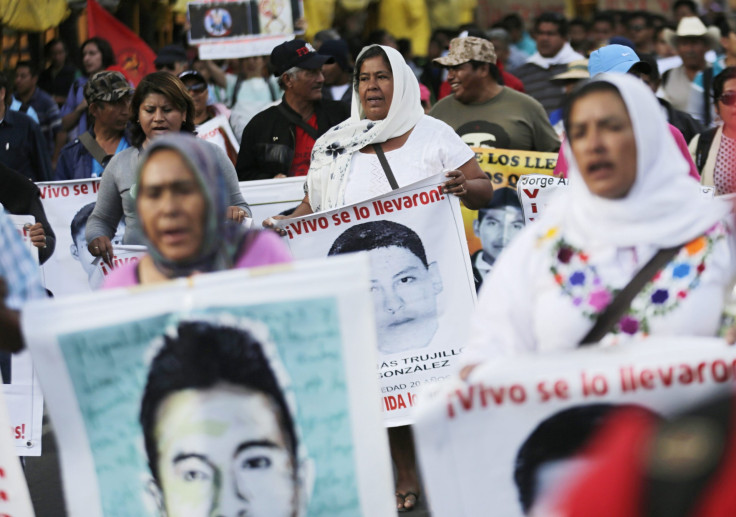Mexican Relatives Of 43 Missing Students Embark On US Tour To Build Support

Mexico’s government already has ended its investigation into the disappearance of 43 students who were allegedly killed last fall by a criminal group working with local police. But the students’ families haven’t curbed their demands for justice – and now they’re taking their campaign on the road through the United States.
Sixteen activists and relatives of the disappeared are embarking on a tour of 30 U.S. cities to draw attention to organized crime and impunity in Mexico in light of the disappearances. They are traveling in three caravans that will take separate routes north through the U.S. – one along the Pacific Coast, another through central states, and a third along the Atlantic Coast. The caravans eventually will unite in Washington, D.C., and end the tour in New York City.
“We need to inform Mexican society and the world [of] the hell we live in, the anguish of not knowing where our children are,” the “Caravana 43” group wrote on a website dedicated to the campaign.
But in addition to spreading awareness about the disappearances, the activists also are lobbying for a U.S.-based movement to halt the sale of arms to Mexican authorities. “We ask [the U.S.] to write letters to their legislative bodies and to tell Obama to stop supporting the sale of weapons to Mexico because they are used to kill our children,” the statement continued.
Under the Mérida Initiative, the primary security pact between the U.S. and Mexican governments, the U.S. supplies training and advisory services to the Mexican military in its efforts to counter drug trafficking organizations. Part of that agreement also allows the U.S. and private U.S.-based companies to supply limited amounts of aircraft and weapons systems to Mexican security forces.
Under the agreement, the U.S. can withhold 15 percent of its security funding unless Mexican authorities submit regular reports that they are complying with certain human rights conditions, including improving transparency in federal police forces and allowing for thorough and fair investigations of human rights abuses. But some watchdog groups, including Human Rights Watch, contend that the U.S. has allowed the funds to be released despite Mexican authorities failing to meet those conditions.
Widespread outrage over the case of the 43 students has presented President Enrique Peña Nieto with one of the biggest challenges to his presidency and reform-oriented agenda so far. In September, students from the Ayotzinapa Teacher Training College in Guerrero, a western state with one of the highest homicide rates in Mexico, clashed with police forces in the town of Iguala while taking a bus back to their hometown, after which they were not seen again.
Investigators said later that the mayor of Iguala, fearing the students would disrupt a speech his wife was giving that same afternoon, ordered the police to shoot at the students and turn them over to a local gang, the Guerreros Unidos. The mayor, his wife and dozens of police officers and gang members were arrested in connection with the incident. Mexico’s federal government later said that gang members confessed to killing the students, burning their bodies and dumping them in a nearby river. Authorities collected remains from the alleged dump site, and confirmed a match between a recovered bone and one of the missing students. In January the government said it had exhausted all lines of inquiry into the incident, and officially determined the students were dead.
But families of the disappeared and other students from the teachers’ college have resisted the government’s theory, with some insisting other students may still be alive. Last month an independent team of Argentine forensics analysts also cast doubt on the government’s report, saying the scientific evidence didn’t fully support its conclusion. Mexico’s attorney general, Jesus Murillo Karam, stepped down from his post as a result of widespread criticism over his handling of the investigation.
© Copyright IBTimes 2024. All rights reserved.











